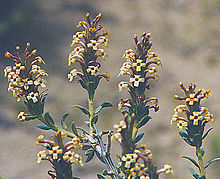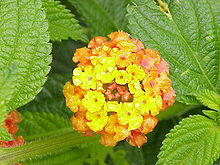Verbena plants
| Verbena plants | ||||||||||||
|---|---|---|---|---|---|---|---|---|---|---|---|---|

Verbena ( Verbena officinalis ), illustration |
||||||||||||
| Systematics | ||||||||||||
|
||||||||||||
| Scientific name | ||||||||||||
| Verbenaceae | ||||||||||||
| J.St.-Hil. |
The verbena family (Verbenaceae) are a family of plants belonging to the order of the mint family (Lamiales). Some species and their varieties are used as ornamental trees in parks, gardens and as bedding and balcony plants. There are also some medicinal plants .
description



Vegetative characteristics
They are mostly herbaceous or woody plants that grow as shrubs , more rarely trees or lianas . The often square or stem -round stems have a different indument depending on the type . The shoot axes are unreinforced or sometimes there are spikes or thorns.
The mostly opposite, rarely arranged in whorls or bundles of leaves are petiolate or sessile. The leaf blades are usually simple or three-part, rarely composed. The leaf margins are smooth, serrated, notched, lobed or cut out. Sometimes the leaves are reduced to scales or spines. There are no stipules.
Generative characteristics
In the lateral and / or terminal, simple or compound, in most species racemose , less often spiked , capricious or zymous inflorescences are the flowers or close together. Most are bracts present, they can be decorative or inconspicuous.
The mostly hermaphroditic flowers are small to medium-sized, zygomorphic (rarely radial symmetry ) and have a double flower envelope (perianth). They have (four to) five (to eight) fused sepals and (four to) five (to eight) fused petals . There is only one stamen circle ; the (two to) four (to five) stamens are fused with the corolla. Usually two carpels are a top permanent ovary grown (synkarp).
There are stone fruits or fruit capsules formed.
ingredients
Resin glands are present on stem axes, foliage leaves, bracts, sepals or petals.
The types of verbena family contain essential oil .
ecology
Many species are pollinated by insects ( entomophile ).
Systematics and distribution
The Verbenaceae family was listed in 1805 by Jean Henri Jaume Saint-Hilaire in Exposition des Familles Naturelles , 1, p. 245. Type genus is Verbena L. Synonyms for Verbenaceae J.St.-Hil. are Durantaceae J.Agardh and Petreaceae J.Agardh .

The areas are in the temperate latitudes , the subtropics and the tropics . They are widespread in the moderate latitudes, with a focus on biodiversity in the tropics. They are absent in central and northern Eurasia .
Insights into the phylogenesis of the order Lamiales obtained with molecular phylogenetic methods have narrowed the scope of the Verbenaceae family. Before that, genera were also included that are today counted among the families of the mint family (Lamiaceae) and the acanthus family (Acanthaceae). The family contains 30 to 35 genera and about 1200 species (as on the AP website ). For example, the genus Verbena was divided into three genres: Verbena s. str., Glandularia and Junellia and in 2009 eleven species from Junellia were placed in the new genus Mulguraea .
According to O'Leary et al. 2009, Marx et al. 2010, Thode et al. 2013, Lu - Irving et al. In 2014 the Verbenaceae family is divided into seven tribes:

Tribus Citharexyleae: habit of Citharexylum spinosum

Tribe Duranteae: Stachytarpheta glauca

Tribus Petreeae: Petrea volubilis

Tribus Priveae: inflorescence of Priva cordifolia

Tribe Verbeneae: Mulguraea ligustrina

incertae sedis: branches of Rhaphithamnus spinosus with leaves and flowers
|
swell
- The Verbenaceae family on the AP website . (Sections Description and Systematics)
- Dissertation by Ursula von Mulert: Phylogeny of the Verbenaceae: Cladistic investigations with morphological and chemical features. , 2001. With a wide range of information on taxonomy and descriptions of the most important genera and analysis of the characteristics. (PDF file; 7.8 MB)
- Flavio França, Sandy Atkins, 2009: Neotropical Verbenaceae at Neotropikey - Interactive key and information resources for flowering plants of the Neotropics . (Sections Description and Systematics)
Individual evidence
- ↑ a b c d e f g h i Flavio França, Sandy Atkins, 2009: Neotropical Verbenaceae at Neotropikey - Interactive key and information resources for flowering plants of the Neotropics .
- ↑ Verbenaceae on the AP website. (engl.)
- ↑ a b Richard Glenn Olmstead et al .: A Synoptical Classification of the Lamiales. : Version 2.6.2 (in prog.) 2016 - PDF.
- ↑ Verbenaceae in the Germplasm Resources Information Network (GRIN), USDA , ARS , National Genetic Resources Program. National Germplasm Resources Laboratory, Beltsville, Maryland. Retrieved March 7, 2014.
- ↑ a b c d e f g h i j k l m n o p q r s t u v w x y z aa ab ac ad ae Rafaël Govaerts (Ed.): Verbenaceae. In: World Checklist of Selected Plant Families (WCSP) - The Board of Trustees of the Royal Botanic Gardens, Kew . Retrieved December 27, 2018.
- ↑ Shou-liang Chen, Michael G. Gilbert: Verbenaceae , p. 1 - the same text online as the printed work , In: Wu Zheng-yi, Peter H. Raven (Ed.): Flora of China , Volume 17 - Verbenaceae through Solanaceae , Science Press and Missouri Botanical Garden Press, Beijing and St. Louis, 1994, ISBN 0-915279-24-X .
- ↑ Nataly O'Leary, Pablo Moroni: Hierobotana Briq., An intriguing monotypic genus of tribe Verbeneae (Verbenaceae). In: Phytotaxa , Volume 164, 2014, pp. 286–290. doi : 10.11646 / phytotaxa.164.4.8
- ↑ P. Peralta, ME Múlgura de Romero, SS Denham, SM Botta: Revisión del género Junellia (Verbenaceae) , In: Annals of the Missouri Botanical Garden , Volume 95, 2008, pp. 338-390.
Web links
- Verbenaceae at DELTA still in the old scope (therefore not entirely consistent with APWebsite). (engl.)
- Shou-liang Chen, Michael G. Gilbert: Verbenaceae , p. 1 - the same text online as the printed work , In: Wu Zheng-yi, Peter H. Raven (Ed.): Flora of China , Volume 17 - Verbenaceae through Solanaceae , Science Press and Missouri Botanical Garden Press, Beijing and St. Louis, 1994. ISBN 0-915279-24-X (English - not entirely consistent with AP website)
- Brief description of the family. (German)
- Search for "Verbenaceae" on the IUCN Red List of Threatened Species .
- Entries about Verbenaceae in Plants For A Future

![{\ displaystyle \ downarrow K _ {(5)} \; [C _ {(5)} \; A_ {5-2}] \; G _ {\ underline {(2)}}}](https://wikimedia.org/api/rest_v1/media/math/render/svg/9e87df5d0c0b9b94d6ce291cb7d06054ad8ab492)
